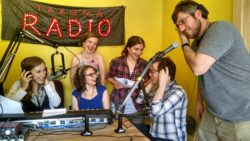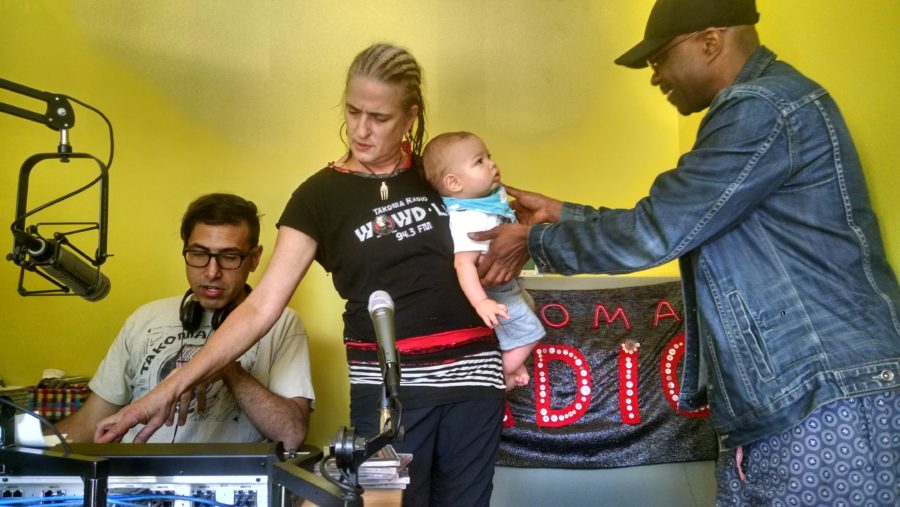In 2013, for the first time in more than a decade, the federal government opened a window for the creation of Low Power FM radio stations. Marika Partridge was ready.
The veteran radio producer and longtime Takoma Park, Maryland, resident wanted to create a space — both on-air and physical — that would be a neighborhood social, cultural and educational hub. So she jumped at the chance to submit an application to the Federal Communications Commission (FCC) to create one of the small, noncommercial FM stations.
The result is Takoma “T-Rex” Radio, otherwise known as WOWD-LP, a low-power station that comes on the air July 16 with a listening radius of 2 to 5 miles. The station, broadcasting at 94.3 FM from studio space rented from Airshow Mastering on Westmoreland Avenue, will reach neighborhoods in upper Northwest and Northeast D.C. and parts of Prince George’s and Montgomery counties in Maryland.

Many voices: The microphones were open, but the station wasn’t broadcasting yet at the open house event.
Takoma Radio won’t be the first or only community radio station in the region — Arlington, Virginia, has the low-power (LPFM) station WERA, and a handful of other small projects such as Anacostia’s We Act Radio maintain livestreams and periodic FM broadcasts. But it’s perhaps surprising that a hotbed of DIY culture like Takoma Park — with its reputation as “the Berkeley of the East” — didn’t already have one. More than 2,800 applications were filed with the FCC, and Takoma Radio received the only new license in the D.C. listening area.
“I’m talking about a mission to serve the community and pockets in the community,” Partridge says. “If you look at the radio dial in D.C. it’s a wasteland. I think also our ideas about ‘internet has killed radio’ is a very privileged perspective and that still a lot of people listen to the radio in their native languages, read newspapers in their native languages and in their communities.”
T-Rex programming will be determined by the people who tune in and want to participate, so Partridge expects shows will be as colorful as the community. Volunteer programming coordinators have been fielding applications for shows for several months, and the diversity of those ideas — combined with ideas from Partridge and her team — encompasses children’s shows; Spanish-language and talk programs; music including blues, local hip hop, punk, acoustic Congolese and a show called Bayou Boogie; live and recorded poetry; gardening tips; local news; and interviews on everything from pinball to astronomy in a program called The Thought Bowl.
“We just have to consider who’s not going to NPR programming and offer some really strong programming for niche audiences right up against those shows,” says Partridge. “Who listens to All things Considered? Well, not people who only speak Amharic.”
A grant will fund an audio production based on a yearlong education program with young people of color from diverse backgrounds and foreign countries. The youths will reflect on their culture, languages, community, music and sense of belonging.
Outreach initiatives like the youth program and live readings and concerts — along with technology training in everything from DJing to Google Drive — are intended to serve as a “come-togetherness” component complementing the on-air content.
There’s a lot of thought behind the station’s process. The overall consolidation of American media in recent decades is triggering a desire and need for local, community-driven LPFM stations like the one WOWD plans to be, says Michael Richards, a communications attorney and former broadcast journalist who helped Takoma Radio win the FCC license. Even the NPR system has been part of the trend toward centralization of news and public affairs content, Richards says.
“There was a tendency to have less that was locally produced because there was so much wonderful national programming,” Richards says. “But what you sometimes lost by having all of these wonderful voices like Ira Glass and all of the programs that were spurred by that, even before the podcast revolution, is that there was less and less space on many public radio stations for something local that wasn’t necessarily news.”
In response to the radio industry’s consolidation and evolution, the Local Community Radio Act was enacted 2010, limiting new LPFM licenses to commercial-free nonprofits only. Corporate broadcasters, worried about signal interference and losing airspace, pushed back and lobbied for restrictions. But nonprofit groups — most notably Prometheus Radio — fought back, and in 2013 a new licensing window finally opened, this time including availability in major urban areas.
Historic Takoma steps up
The realization of Takoma Radio has been more than five years in the making. Partridge says she had been planning even before the FCC announced the new round of licensing.
“From the very beginning of me saying to people, ‘I’m going to start a radio station,’ depending on their age group, the young people were going, ‘What, why, huh?’ and the older people would say, ‘Uh, really, there’s so much. For what?'” Partridge says.
Skepticism wasn’t the biggest hurdle, however. Getting the FCC license required sponsorship by a nonprofit organization, one with a board that had to be vetted by the government (sample questions: Have you ever done pirate radio? Are you a convicted felon?) and could fill out the application for the station. At the eleventh hour, Art for the People, the organization originally sponsoring Partridge’s project, bowed out.
“There was this really scary moment. Then, with hours to spare for filing with the FCC … Historic Takoma voted yes,” Partridge says. Although she calls the vote an “upset” for the board “one person quit that very night, right then and there” — she says most saw a unique opportunity in the unanticipated partnership.
Historic Takoma, Inc. was founded in 1979 with a mission of “preserving the heritage” of Takoma Park and the nearby Takoma neighborhood in D.C. Diana Kohn, the organization’s president, is one of the biggest advocates for taking on Takoma Radio.
“To our knowledge, no other historical society in the country has a radio station, but [novelty] never stopped anybody in Takoma Park from doing anything.” —Diana Kohn, president of Historic Takoma Inc.
“We are trying to collect the history of this community, and radio struck me as being a very unique way to capture not just the current history, but a flavor for the diversity of the people who make up the community now — a portrait of who we are,” Kohn says. “It’s not just that we get something out of the radio, but the radio can foster that more unified sense of identity.”
The group’s involvement with the radio station certainly upends the traditional expectations for a historical society’s role in its community.
“To our knowledge, no other historical society in the country has a radio station, but [novelty] never stopped anybody in Takoma Park from doing anything,” Kohn says.
Kohn points to some of Takoma’s defining moments as proof: The city began in 1883 as the first commuter suburb; residents built their own schools instead of waiting on jurisdictional arguments between D.C. and Maryland; and in 1963 residents stopped a freeway from being built through the center of the town by protesting and establishing historic districts that could not be razed. To her, the creation of Takoma Radio just makes sense.
“One of the things that makes Takoma unique is the insistence of the people who live here to do things,” Kohn says.
That attitude has helped the station build resources, too. The team behind Takoma Radio collectively has decades’ worth of broadcast, technical and outreach experience. Partridge’s connections in and around Takoma Park — and within the often insular radio community — clearly count for a lot, too. The team’s relationships have been vital for significant contributions like cheap rent for the studio, website-building help, spaces to hold fundraisers and donated auction items and equipment.
“We really try to give full projects to people and just say step up and do that,” Partridge says.
Nothing is certain
Volunteers have been hard at work. Program applications have been vetted and the broadcast schedule is being refined. The studio is furnished with a sparkling soundboard, and an antenna is on the roof. On the surface, WOWD-LP looks like it’s already inked into Takoma Park’s history books. But this isn’t necessarily an “if you build it they will come” situation.
Station Manager Tatyana Safronova — who also works part-time at the D.C. Public Library on their audio podcasting and oral histories projects — recognizes that outreach is essential for long-term success. The station has offered workshops for students at the Silver Spring library, partnered with the Takoma Park recreation center to engage youth groups, sponsored a go-go show at the town gazebo and featured a visiting Ethiopian poet. Safronova says the station leadership “can’t expect people to just come into the studio.”
But, she adds, once they do, “they need to bring their own programming, their own ideas about what radio should sound like. Because we can’t dictate what the radio sounds like; it would become obsolete in five minutes.”
As with most nonprofits, raising money will continue to be a challenge, likely a make-or-break one. And even in a community like Takoma Park, which seems like a natural fit for an LPFM station, true staying power will have to be earned — especially in an era when people often have multiple screens vying for their attention at any given moment. And so Partridge is suitably blunt when talking about the future of the station.
“We want it to be really vital in this community,” she says. “In five years it’s either going to be vital or dead.”
The grand opening of Takoma Radio takes place from 9 a.m. to 6 p.m. Saturday, July 16 at 7014 Westmoreland Ave., Takoma Park, Md.


